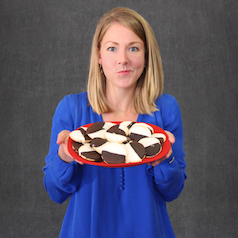Tell us a little bit about Code Fellows.
Lee Broxson: Code Fellows is a coding academy that’s been around for nearly six years. It was conceived because of the high demand for software engineers in the tech industry. Coding academies like Code Fellows aim to pack a ton of information and learnings into a short period of time, and subsequently, they tend to become “sink or swim” environments for participating students.
This environment can be really hard at first, especially if you’re expecting the pace of a four-year institution. But you’re learning skills that are in high demand, and getting training that otherwise may not be available if you’re limited by time or financial resources. It’s intense but worth it, considering that you’re trained in five months—not four years.
Can you explain the work that Avalara does with Code Fellows?
LB: I was the first Code Fellows grad to work as an engineer at Avalara, and we’ve since established a recruiting pipeline from both Code Fellows and other coding academies. We’ve participated in happy hours, pledged money to Code Fellows’ Diversity Scholarship Fund, and even hosted a “Bug Bash” that let current Code Fellows students and grads alike compete to find bugs in the AvaTax update product I’m currently working on. I’ve always been a fan of Avalara’s work culture, but being able to have fun, improve our products and enjoy the successes of code school grads simultaneously proved to be a great time.
Can you tell us a bit more about your day-to-day role as a UX engineer?
LB: Of course! In the morning, I join the other folks on my team for our daily stand-up meeting. Following a “scrum” process, we check in with each other for what we worked on previously, what we’re working on now, and what we plan to work on today. We then identify any blocking items that our teammates may be able to help assist us in getting through.
From there, I’ll usually investigate the work I have on-deck for the day, get an understanding of the scope, and reach out to stakeholders for any clarity I need.
Once I have completed a task—usually it is a UI feature of some kind, so there is a visual component—I will run it by our design team for confirmation that everything is in order and all of the pixels look right. Then our team goes through a technical review process to ensure no new bugs have been introduced.
I also sometimes have a meeting or two during the day with the members of my team. There’s a lot of intra-team technical knowledge sharing, and we like to teach each other the stuff we figure out in the course of a given day.
How does a coding academy like Code Fellows prepare you to work at a place like Avalara?
LB: One of the largest selling points for coding academies are the immediately applicable skills they teach you. When I started, I noticed that the tools I was using at Avalara were all tools I had been working with for the past few months with Code Fellows.
Why do you feel that coding academies like the Code Fellows program are important?
LB: Above all else, coding academies meet a vital need to train job candidates in a very in-demand skill set. They also offer a more accessible route to higher education for those who aren’t afforded the opportunity because of time or resources.
What has been the best part about working at Avalara so far?
LB: As I mentioned, I’m a huge fan of the culture here at Avalara. I’ve never worked at a place where employees have enjoyed being at work as much as they do here. I also feel that employees can have a voice here, and that voice is heard by decision-makers at the company. I think that’s fairly unique for a company of our size and magnitude.
Do you have any words of advice for people who are considering joining a coding academy like Code Fellows?
LB: I, along with many other Code Fellow grads, can comfortably say that it was the longest, most intense, and most difficult five months of my life. Dedicating 12+ hours a day for nearly half a year to your craft is not a task to be taken lightly, but the perseverance that Code Fellows instilled in me is a skill that will benefit me for the rest of my professional career. I’m looking forward to seeing future collaboration between Avalara and coding academies as more and more graduates join our ranks.
Thanks for sharing, Lee! If you’d like to learn more about how a coding academy can help you learn today’s in-demand tech skills, get in touch.

